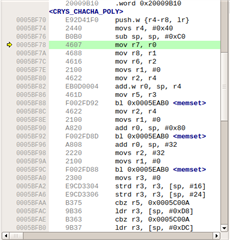static void hex_text_print(char const* p_label, char const * p_text, size_t len)
{
NRF_LOG_RAW_INFO("---- %s (length: %u) ----\r\n", p_label, len);
NRF_LOG_FLUSH();
// Handle partial line (left)
for (size_t i = 0; i < len; i++)
{
if (((i & 0xF) == 0) && (i > 0))
{
NRF_LOG_RAW_INFO("\r\n");
NRF_LOG_FLUSH();
}
NRF_LOG_RAW_INFO("%02x ", p_text[i]);
NRF_LOG_FLUSH();
}
NRF_LOG_RAW_INFO("\r\n");
NRF_LOG_RAW_INFO("---- %s end ----\r\n\r\n", p_label);
NRF_LOG_FLUSH();
}
static void text_print(char const* p_label, char const * p_text, size_t len)
{
NRF_LOG_RAW_INFO("----%s (length: %u) ----\r\n", p_label, len);
NRF_LOG_FLUSH();
for(size_t i = 0; i < len; i++)
{
NRF_LOG_RAW_INFO("%c", p_text[i]);
NRF_LOG_FLUSH();
}
NRF_LOG_RAW_INFO("\r\n");
NRF_LOG_RAW_INFO("---- %s end ----\r\n\r\n", p_label);
NRF_LOG_FLUSH();
}
static void encrypted_text_print(char const * p_text, size_t encrypted_len)
{
hex_text_print("Encrypted text (hex)", p_text, encrypted_len);
}
static void decrypted_text_print(char const * p_text, size_t decrypted_len)
{
text_print("Decrypted text", p_text, decrypted_len);
hex_text_print("Decrypted text (hex)", p_text, decrypted_len);
}
static void mac_print(uint8_t const * p_buff, uint8_t mac_size)
{
hex_text_print("MAC (hex)", (char const*)p_buff, mac_size);
}
void hub_testChaChaEncryption() {
//initialise
ret_code_t ret;
ret = nrf_crypto_init();
APP_ERROR_CHECK(ret);
ret = nrf_mem_init();
APP_ERROR_CHECK(ret);
//encrypting
//plain message - example of AMB event from sensor in AMP documentation
static uint8_t plain[NRF_CRYPTO_EXAMPLE_AES_MAX_TEXT_SIZE] = {0x41, 0x54, 0x27, 0x08, 0x05, 0x80, 0x51, 0x00, 0x23, 0x01};
static uint8_t mac[NRF_CRYPTO_CHACHA_POLY_MAC_SIZE];
static uint8_t nonce[NRF_CRYPTO_CHACHA_POLY_NONCE_SIZE];
static uint8_t adata[] = {0xAA, 0xBB, 0xCC, 0xDD}; //how to represent this in Python? Use header of a packet?
static nrf_crypto_aead_context_t chacha_poly_ctx;
static char encrypted[NRF_CRYPTO_EXAMPLE_AES_MAX_TEXT_SIZE];
ret_code_t ret_val_chacha;
uint32_t len = sizeof(plain);
memset(mac, 0, sizeof(mac));
memset(nonce, 0, sizeof(nonce));
ret_val_chacha = nrf_crypto_aead_init(&chacha_poly_ctx, &g_nrf_crypto_chacha_poly_256_info, m_key);
AES_ERROR_CHECK(ret_val_chacha);
__LOG(LOG_SRC_APP, LOG_LEVEL_INFO, "Starting to encrypt\n");
ret_val_chacha = nrf_crypto_aead_crypt(&chacha_poly_ctx,
NRF_CRYPTO_ENCRYPT,
nonce,
sizeof(nonce),
adata,
sizeof(adata),
plain,
len,
(uint8_t *)encrypted,
mac,
sizeof(mac));
__LOG(LOG_SRC_APP, LOG_LEVEL_INFO, "Encryption done\n");
encrypted_text_print(encrypted, len);
mac_print(mac, sizeof(mac));
}
I have an issue with attempting to test an encryption on a sample data made in that function and then called in int main(void).
What happens is that during the debug the CRYS_CHACHA_POLY function was being called because I did put a breakpoint there. So "Starting to encrypt" line is being printed, and then after stepping in it goes to assembly, but at that green line it throws "Softdevice assert" error from app_error_weak.c of Mesh SDK.

If I try to run the program without breakpoints, it prints "Starting to encrypt", but it doesn't print any errors or line "Send a message to hub encrypt" (line content is just an indication).

What could be the reason for not working properly? ICould it be that the drv_clock_init wasn't used?
All screenshots attached.


